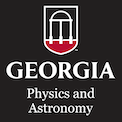Events Calendar View
-
Mathematical Physics Seminar
Aug 28, 2013
- no meeting this week
-
Departmental Colloquium
Aug 29, 2013
Massive Star Formation Through The Universe
Massive stars have played a dominant role in shaping our universe since its earliest times, but there is no consensus on the mechanism by which they form. I review the physical processes thought to be important in massive star formation, concentrating on a particular theoretical model, Turbulent Core Accretion. This assumes the initial conditions are massive, turbulent, magnetized cloud cores of gas and dust that are reasonably close to virial equilibrium. We test this via theoretical simulations of the physics and chemistry of the interstellar medium and observational searches for these cores. We next consider the protostellar collapse phase as a massive star grows from the core. Various forms of feedback become important in reducing the efficiency of accretion, although it is not clear if one particular mechanism operates to set a fundamental limit on the maximum stellar mass. Again, these theoretical ideas can be tested by observations of massive stars forming in our Galaxy today. Finally, I discuss an application of massive star formation theory to the early universe: how massive were the first stars and could they have been the progenitors of supermassive black holes?
-
Mathematical Physics Seminar
Sep 4, 2013
Connecting asymptotic analysis in mathematics and physics
-
Departmental Colloquium
Sep 5, 2013
Atomic and Molecular Collisions using a Time-Dependent Close-Coupling Method
We review the recent progress made in applying the time-dependent close-coupling approach to ionizing collisions of electrons, photons, and bare ions with small atoms and molecules.
-
Mathematical Physics Seminar
Sep 11, 2013
Connecting asymptotic analysis in mathematics and physics, cont.
-
Departmental Colloquium
Sep 12, 2013
Exploring Spin Glasses and other Complex Energy Landscapes with Extremal Dynamics
I describe Extremal Optimization (EO), a general-purpose, local search heuristic for hard combinatorial (and physical) problems such as bi-partitioning (ie, model-B ferromagnets), coloring (ie, Potts antiferromagnets), and max-cut (ie, Ising Spin Glasses). EO is motivated by the Bak-Sneppen model of self-organized criticality (SOC). SOC provides a general dynamics of driven dissipative systems that operate far from equilibrium and exhibit many emergent properties, such as scale-free fluctuations, memory and learning, and persistent returns to untypical (here: ground-state) configurations. The generic properties of EO are explored, which explain the efficiency of EO in searching many 'complex energy-landscapes'. Numerical results of EO are discussed especially for the Edwards-Anderson spin-glass problem.
Page 45 of 121, showing 6 records out of 723 total, starting on record 265, ending on 270


